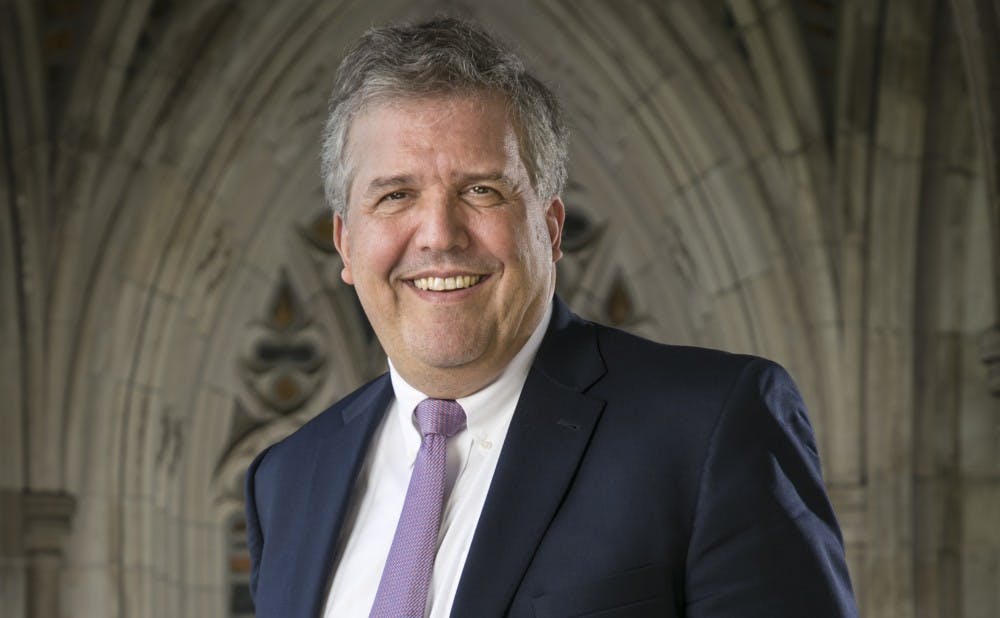L. Gregory Jones, dean of the Divinity School, resumed office in August 2018 after Elaine Heath unexpectedly stepped down. Greg Jones previously served as the dean from 1997 to 2010. Jones spoke with the Chronicle to reflect on what convinced him to come back to Duke, his goals for the next few years and what he hopes to do to address complaints about the treatment of LGBTQ+ and African American students that intensified during Heath’s tenure. This interview has been edited for length and clarity.
The Chronicle: What convinced you to come back?
L. Gregory Jones: It came as a great surprise when president and provost asked if I would serve again. I actually had lots of other things in view for this year. When I talked to some people about what gifts they thought the school needed and what strengths I could bring, it became pretty clear to me that this was a sense of a calling. It felt right. Since then, I have been warmly welcomed back and I see it as an opportunity to serve a school I deeply love and care about.
TC: What were some of your main involvements between 2010 and 2018?
GJ: When I stepped out of the dean’s role in 2010, I moved to university administration and then served as the vice president and vice provost for global strategy and programs. I developed an illness and had to step out of that role. Gradually, I got better and became involved in teaching and advisory work. I had a brief sojourn to Baylor University as executive vice president and provost and then came back to serve on the Duke faculty a little over a year ago.
TC: What do you think about complaints about the treatment of LGBTQ+ and African-American students that the school has faced?
GJ: These are issues that we need to address in ongoing ways. It is very important to create a culture that addresses inclusion across a variety of spectrums and includes our LGBTQ and African American students and faculty. The school administration is working diligently and consistently to achieve this.
TC: What are some ways in which you are trying to address the problems that became a discussion point in the last few years?
GJ: There are cultural issues, financial issues and academic issues that we are trying to address diligently and consistently. Our aim is to focus on the future with a vision. We are working to create a respectful community, to listen, and to learn where the challenges and the opportunities lie for the school as a whole.
A committee, led by Sujin Pak, associate professor of the history of Christianity and vice dean of academic affairs at the Divinity School, was formed last spring following student protests. The committee has produced recommendations, that we are doing our best to implement. We recently interviewed an African American woman for a senior faculty position whom we hope to be able to recruit. There will also be a course taught this spring by a scholar of gender, sexuality and theology.
TC: Did issues around Duke's treatment and relationship with LGBTQ+ and African American students contribute to the financial problems?
GJ: Our enrollment dropped slightly and the bad publicity probably did not help. But there are also broader trends in the theological education and professional education that are presenting enrollment challenges and have contributed to budgeting issues. The real question is that how can we ascertain that the school has a sustainable budget going forward.
TC: Do you think that a protest like that at the State of the School speech is the right way for students to have their concerns heard?
GJ: Well, students have a right to protest but I do not think that was the appropriate venue to raise concerns. I believe that a protest ought to be the last resort and that the best tool is dialogue. If there is an unwillingness to respond, then a non-disruptive protest of some sort or another is certainly understandable. But the most constructive means, whenever possible, is to sit and engage and we have been trying to do just that.
TC: What is the Divinity School doing to build interfaith bridges?
GJ: I believe that the best pathway to peace is through interfaith understanding. We were amongst the first to recruit Abdullah Antepli, chief representative of Muslim affairs and adjunct faculty of Islamic studies, as the Muslim chaplain at Duke and he has been an active part of our community ever since. We recently received notification of a grant that will be used by Antepli, Laura Suzanne Lieber—professor of religious studies and a rabbi—and Ellen Davis—Amos Ragan Kearns professor of Bible and practical theology—to co-teach a course and lead projects around the subject of religion as a source of violence and religion as a source of peace, in an effort to build interfaith bridges.
TC: What do you think has changed between your last tenure and now?
GJ: A lot has changed and I have changed. I came back 8 years later with fresh eyes, eager to see how the school had developed and grown. I’m not trying to focus on what I was used to, but on where the school is now and how we can strengthen it, make it more inclusive and healthy and set it on a smooth trajectory for the future.
Get The Chronicle straight to your inbox
Signup for our weekly newsletter. Cancel at any time.

